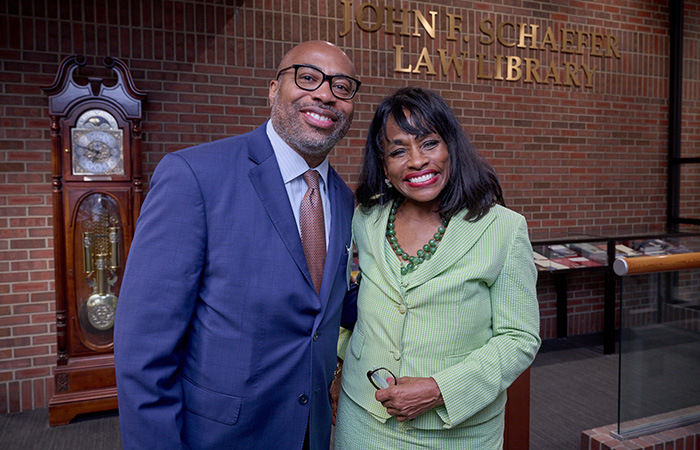Law Panel Offers Wise Counsel to Guide Incoming Law Students

Professor Myles Lynk, Chief Justice Elizabeth Clement, Dean Greene, Veneshia Cezil,
Associate Professor Justin Simard
Words of wisdom from a distinguished panel made up of a state Supreme Court chief justice, a renowned law professor, and a member of Michigan Attorney General’s office gave new Michigan State University College of Law students a clear picture of what professionalism in action looks like. All three agreed that from the first day of law school, students need to demonstrate “Professionalism in Action,” the focus of the panel discussion.
“You build your reputation from day one of law school,” said Veneshia Cezil, Chief Operating Officer and Diversity and Inclusion Officer for the Michigan Department of the Attorney General. Elizabeth Clement, Chief Justice of the Michigan Supreme Court and a 2002 graduate of the MSU College of Law, said, “You want to be honest, direct and forthright. That starts at the beginning of law school.”
“Law school is an opportunity,” said Professor Myles Lynk, a visiting professor at MSU with a long and storied career in public service. “Don’t look at it as a burden.”
The panel discussion, “was an opportunity to show the students you’re part of this bigger thing,” said Associate Professor Justin Simard who moderated the panel program. “You’re becoming a lawyer already. I think this panel showed that even if you have your dream career, getting there wasn’t a straight line. They had setbacks, they had career changes.”
Panelists Shared Career Paths

Federal Magistrate Judge Curtis Ivy and Dean Greene
Professionalism in Action Capped Off with Dean’s Introduction to Legal Community, Reception
Dean Greene recognized Professional in Action panelists and the many alumni and other attorneys who volunteered as mentors to incoming law students during brief remarks at a reception hosted by the College of Law Library. “Throughout this week, we have seen that a lawyer is simultaneously a representative of their clients, an officer of the legal system, and accountable for justice.”
While the legal profession has standards and norms of conduct required by detailed ethical rules, Dean Greene stressed to students that “you also have the responsibility for the development of your own professional identity, requiring you to explore and interrogate your core values and incorporate new ones, grow in your ethical maturity, and broaden and deepen the experiential diversity of your professional network.”
Justice Clement recalled her first tentative day in law school. “I never thought I’d be in the position I am now,” she said. “But anything and everything is possible. I was faced with things I was not really comfortable with and I pushed on.”
“I was able to grow right here in Michigan,” Ms. Cezil said. “With this profession, you have the opportunity to be the voice of the voiceless.”
Professor Lynk, who spent years working in the federal government, as well as in private practice and academia, told students they should grab the opportunity to work in public service if possible. “If you have the chance to work as a lawyer in Washington, D.C., do it,” he said. “In public service, you can do well and you can do good. You’re dealing with real life and real people.”
Final Piece of Advice for Incoming Law Students
“Ask for help,” Ms. Cezil said. “Ask the question. If you don’t understand something, reach out to others.”
“Get to know your professors,” Professor Lynk said. “Ask questions, learn to be comfortable speaking in class. Be collegial, be helpful, be engaged.”
“Take a look at yourself and identify your strengths and weaknesses,” Judge Clement said. “You don’t have to be the best public speaker or the best writer, but there should be a balance.”
The three panelists were invited to speak Thursday as part of Foundations Week on the topic of “Professionalism in Action.” Following the 45-minute panel presentation, small groups of students met in breakout discussions led by volunteer lawyers and law professors from around the state. The 90-minute discussions focused on the role of lawyer and what a lawyer can, should, and must be.

